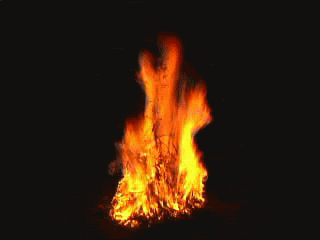我们今天来学习《纽约时报》一篇关于巴黎圣母院大火的报道,作者用短短两句话,将大火的形势和目击者的情绪反应刻画得淋漓尽致。我们一起来字斟句酌,细细品读。
最近后台很多小伙伴在问新一期精读社的报名时间,这里统一回复一下:
新一期精读社会在
4月27日
(明天)晚上
19:
30
准时开始招新,欢迎大家参加,
名额十分有限
,大家记得订好闹钟⏰
大家先阅读原文,有读不懂的地方不要紧,后面会有详细的讲解。
New York Times
Notre-Dame Cathedral in Paris Catches Fire
PARIS — Notre-Dame cathedral, the symbol of the beauty and history of Paris, was
scarred
by an extensive fire on Monday evening that caused its
delicate
spire to collapse,
bruised
the Parisian skies with smoke and further
disheartened
a city already
back on its heels
after weeks of violent protests.
The
spectacle
of flames
leaping
from the cathedral’s wooden roof — its spire glowing red then turning into a
virtual
cinder —stunned
thousands of
onlookers
who gathered along the
banks
of the Seine and packed into
the
plaza
of the nearby Hôtel de Ville,
gasping
and covering their mouths in horror and wiping away tears.
New York Times
Notre-Dame Cathedral in Paris Catches Fire
-
我们先来看标题,
Notre-Dame cathedral
即巴黎圣母院。Notre Dame
在法语里是“我们的圣母”的意思。
cathedral
[kəˈθiːdrəl] 指“大教堂”,注意单词的重音。
-
catch fire
指”
着火“,非常简单的两个词,但大家注意,这篇文章是大火发生后的报道,为什么却用了一般现在时呢?这其实是新闻标题独特的时态表现方式,使用
一般现在时
是
为了表示事件
刚刚发生
,凸显新鲜感和冲击力。再举几个简单的例子:


-
再比如,AP美联社在报道刘强东强奸案的女方起诉刘强东时,标题(如上图)使用的是一般现在时
sues
,而非一般过去时
sued
-
细心的同学还会发现,这里woman怎么没有加冠词a,直接裸奔了?
我们在精读社教大家回译时反复强调,可数名词是不能单独出现的,要么加冠词,比如
the woman
或
a woman
,要么使用复数形式,比如
women
,不能够单独出现。
难道AP美联社也会犯这种低级的语法错误?
事实并非如此。我们都知道,
新闻标题的
字数和版面都是十分有
限的
,所以新闻作者都要想方设法
为标题“瘦身
”,
省略一些虚词
以及语法成分,
比如
the, a , are
等等,以节省空间。
大家以后在阅读新闻的过程中多留意。
接下来我们来看文章的第一段,这个段落只有一句话,独句成段,用一连串形象生动的小词勾勒出巴黎圣母院大火的形势:
PARIS — Notre-Dame cathedral, the symbol of the beauty and history of Paris, was
scarred
by an extensive fire on Monday evening that caused its
delicate
spire to collapse,
bruised
the Parisian skies with smoke and further
disheartened
a city already
back on its heels
after weeks of violent protests.
-
文章一开篇作者便点出了事件的主体:
Notre-Dame cathedral
接下来作者用同位语
the symbol of the beauty and history of Paris
高度凝练
地总结了巴黎圣母院的意义和地位。
-
scar
小词
scar
用在这里十分漂亮。
scar
作名词既可指身体上的 “伤疤,伤痕”,也可指精神上“创伤”,作动词同样也兼具“留下伤疤”和“使…受创伤”两层含义,用在这里既形象地表现巴黎圣母院的外观被烧得伤痕累累,同时也体现出巴黎圣母院所象征的历史价值因此受损。
-
bruise
[bruːz]
与前文的scar一样,也是一个形象的小词。
bruise
作名词指 “淤青,青肿”,作动词指“留下淤青,擦伤,碰伤”,大家可以想象一下一个人被打得鼻青脸肿的样子,很有画面感。
-
dishearten
[dɪsˈhɑːtən]由dis(不)-heart(心)-en(动词后缀)构成,表示“使…不开心,使…沮丧,使灰心”
(to make sb lose hope or confidence)
,相当于
discourage
。
-
smoke
让我联想到一个短语
go up in smoke
指“彻底焚毁,烧光”
(if something goesup in smoke, it burns so that it is completely destroyed)
,也可指“灰飞烟灭,化为泡影”
(if a plan or somework goes up in smoke, it fails or you cannot continue with it)
。一位54岁的巴黎人在大火后说:
It is eight centuries of history
going up in smoke.
It’s the heart of the country. I think that in our generation, people won’t see Notre Dame built again. It’s over.
唉,最后一句话真的很戳心。

-
be back on one’s heels
来自习语 set sb back on sb's heels,
指“受惊吓,受打击”
( given an unpleasant surprise; upset suddenly)
,这个表达也十分形象,
heels
本义是“脚后跟”,be back on one’s heel形容“被吓得往后连退数步,被打击得步步败退”。
disheartened a city already (back on its heels / after weeks of violent protests)
中back on its heels after weeks of violent protests作后置定语修饰a city,指“这座已在连续数周的暴力抗议中备受打击的”城市
-
作者连用
scar
,
bruise
,
dishearten
,
heels
多个拟人化的小词,仿佛将巴黎圣母院和巴黎视作一位伤痕累累的至亲之人,字里行间流露出作者的惋惜之情。
巴黎——巴黎圣母院是巴黎之美与悠久历史的象征,周一晚上,一场大火令它伤痕累累,精致的塔尖倒塌,烟雾笼罩巴黎的天空,令这座在数周的暴力抗议中备受打击的城市更加沮丧。
第二段作者继续刻画熊熊燃烧的大火,随即引出目击者当时的反应
。
The
spectacle
of flames
leaping
from the cathedral’s wooden roof — its spire glowing red then turning into a
virtual
cinder —
stunned
thousands of
onlookers
who gathered along the
banks
of the Seine and
packed into
the
plaza
of the nearby Hôtel de Ville,
gasping
and covering their mouths in horror and wiping away tears.
-
这句话结构稍微复杂一点,我们提炼一下主干:The spectacle // stunned // thousands of onlookers.
-
spectacle
[ˈspektɪkl ̩]
指“奇特的、令人惊讶的景象”
(an unusual or interesting thing or situation that you see or notice – used especially in order to show disapproval)
,这里指或熊熊燃烧的景象,介词of后面是对
spectacle
的具体描述。
-
flame
指“火焰”,"被大火吞没"写作
be engulfed in flames
,这也是许多外刊在叙述这一事件时用到的表达。在
flame
前加上前缀
a
变成形容词
aflame,
指“着火的,燃烧着的”,相当于
burning
,形容词
blaze
也有此义,但程度比
aflame
深,指“熊熊燃烧的”。
-
leap
指“跳跃”,这里形容大火燃烧的景象

-
leap
也可作名词,我们在
纽约时报:范冰冰消失逾三月,到底发生了什么?
这篇文章曾讲过leap的名词用法, 文章开头是这样介绍范冰冰的:
Fan Bingbing is arguably the most famous actress in China, a prolific star who
has made the leap to
international fame with roles in the “Iron Man” and “X-Men” franchises.
范冰冰可以说是中国最著名的女演员了,这位多产的影星凭借在《钢铁侠》(Iron Man) 和《X战警》(X-Men)系列中扮演的角色,一跃成为国际影星。
短语
make the leap to international fame
便是指一跃成为国际明星。
-
再给大家补充两个leap相关写作亮点表达:
-
1.
by / in leaps and bounds
,形容改善或进步非常迅速,突飞猛进。比如《经济学人》一篇关于电子商务的文章提到:
E-commerce is growing by leaps and bounds.
电子商务发展迅猛。我们联系热点话题仿写一下这句话:
-
The gig economy is growing by leaps and bounds.
零工经济正在迅速发展。
-
AI technology is improving by leaps and bounds.
人工智能正
在迅速发展。
-
再比如
His English has improved by leaps and bounds after following “独霸上海的妖怪”。
关注“独霸上海的妖怪”后,他的英语水平突飞猛进。
-
onlooker
指“旁观者”,来自于动词短语
look on
。类似的表达还有
bystander
,指“旁观者,局外人”,来自于动词短语
stand by
。
-
virtual
指“几乎的”
(very nearly a particular thing)
,我们在讲
考研英语真题精读:报刊艺术评论的衰落|2010 Text 1
时也讲过,
virtual
也可表示“虚拟的”,我们熟悉的虚拟现实VR,全称便是
virtual reality
。
-
cinder
[ˈsɪndər]
指“煤渣,炭渣”,这个词了解即可。
-
stun
义为“使大吃一惊,使震惊”
(to surprise or upset someone so much that they do not react immediately)
-
形容词
stunned
指“目
瞪口呆的,惊讶的”,比如《经济学人》的报道中有这样一句话:
StunnedParisians watch centuries of history dissolve in flames
-
形容词
stunning
既可指“令人震惊的”,也可形容“极有魅力的,极漂亮的”
(extremelyattractive or impressive),
比如你的朋友穿上刚买的裙子,问你这件裙子好看吗?这时你就可以给出一个满分回答:
You look absolutely stunning in that dress.
-
bank
在这里不是指“银行”,而是“岸”,the banks of the Seine指“塞纳河两岸”。
bank
也可作动词,短语
bank on sth
指“依靠,指望”,比如我们在精读社选文
经济学人:iPhone销量下滑,为什么是件好事?|双语精读
中学过
:
Analysts reckon that the number of smartphones sold in 2018 will be slightly lower than in 2017, the industry’s first ever annual decline. All this is terrible news for investors who had
bank
ed on
continued growth .
分析师认为,2018
年智能手机销量将略低于
2017
年,这是该行业首次 出现年度销量下滑。对于指望手机销量持续上升的投资者来说,这些消息很糟糕。
-
plaza
[ˈplɑːzə]
指“广场”
-
pack into sth














